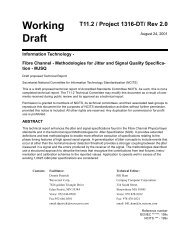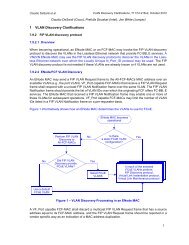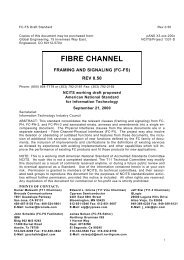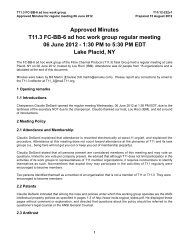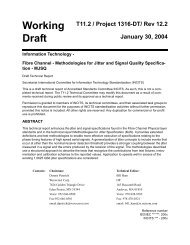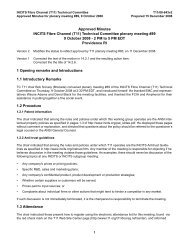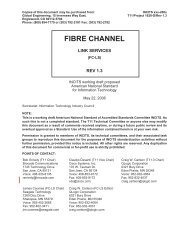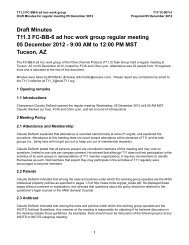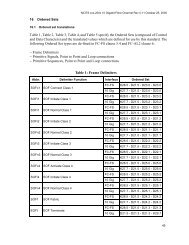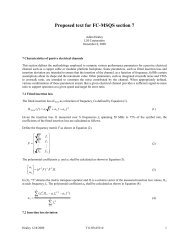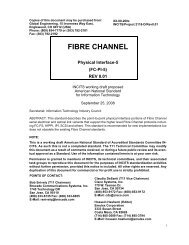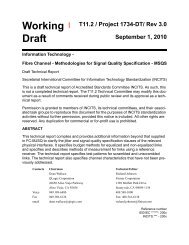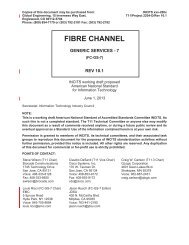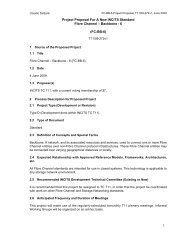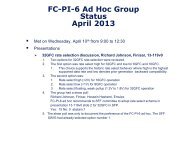FIBRE CHANNEL - T11
FIBRE CHANNEL - T11
FIBRE CHANNEL - T11
You also want an ePaper? Increase the reach of your titles
YUMPU automatically turns print PDFs into web optimized ePapers that Google loves.
6.2 Alternate Login_BB_Credit management<br />
TR-xx-1998 Fibre Channel Tape Rev 1.07 August 7, 1998<br />
OPN Originators may open full or half duplex, regardless of the value of Login_BB_Credit. See Annex<br />
A for examples.<br />
Interoperability with devices that advertise Login_BB_Credit=0 is required.<br />
After completing the Loop Initialization Procedure, Login_BB_Credit shall be zero with all devices until<br />
after completion of the SCSI Target Discovery protocol (see 10.3).<br />
NOTE – This is essential for two reasons: The device at a particular address that had Login_BB_Credit > 0<br />
may have been replaced by a device with Login_BB_Credit = 0. Until SCSI Target Discovery is complete,<br />
there is no way to be sure that the port is communicating with the Login_BB_Credit > 0 device. Secondly, a<br />
device may have been trying to balance credit by not sending CLS when the LIP occurred. The LIP could have<br />
prematurely forced the device into the MONITORING state at a time when it has insufficient buffers available.<br />
Requiring SCSI Target Discovery before assuming Login BB_Credit > 0 enables the device to free its buffers<br />
before attempting to resume normal operations.<br />
6.3 Loop Initialization features<br />
NOTE – The information in this subclause is provided for information only and is not intended as a replacement<br />
for the relevant standard.<br />
NL_Ports shall attempt to acquire their previously acquired AL_PA before they attempt to acquire<br />
their Hard Address, unless the NL_Port has experienced a power cycle, power-on reset, recognized<br />
a LIP(AL_PD,AL_PS) for that port, or any other event that causes the previously acquired AL_PA to<br />
be lost.<br />
6.3.1 Initializing LIP(F7,F7) and LIP(F7,AL_PS)<br />
If there are no address conflicts, these LIPs shall have no effect on existing Exchanges except that<br />
the Exchange in progress may be disrupted, resulting in a ULP timeout. LIP(F7,F7) is used if the initiating<br />
NL_Port has no valid AL_PA, and LIP(F7,AL_PS) is used if it does.<br />
6.3.2 Selective Hard Reset LIP(AL_PD,AL_PS)<br />
Upon recognition of LIP(AL_PD,AL_PS) the NL_Port designated by AL_PD shall perform the appropriate<br />
resetting actions specified in table 23. All other L_Ports shall treat this as LIP(F7,AL_PS). SCSI<br />
Targets are prohibited from issuing this LIP.<br />
6.3.3 Loop Failure LIP(F8,AL_PS) and LIP(F8,F7)<br />
A Loop Failure is defined as detection of any of the following:<br />
a) Loss of Signal<br />
b) Loss of Synchronization for longer than R_T_TOV<br />
If a Loop Failure occurs, the L_Port which detects the failure shall issue LIP(F8,AL_PS) if it has a valid<br />
AL_PA, or LIP(F8,F7) if it doesn’t.<br />
6.3.4 Failure to obtain an AL_PA<br />
An L_Port which loses its previously acquired address shall implicitly logout all NL_Ports regardless<br />
of whether or not that AL_PA was previously-assigned, hard-assigned, or soft-assigned. If no soft ad-<br />
29



